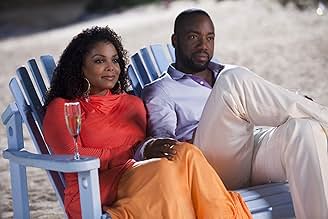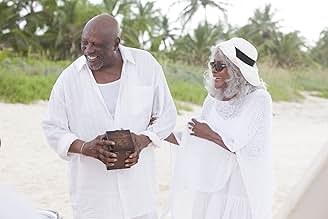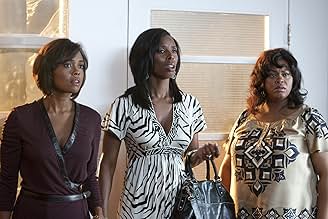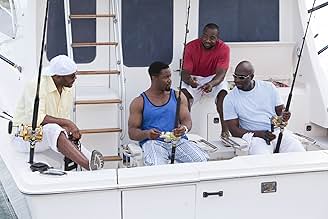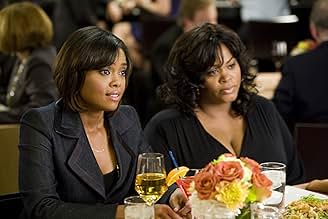VALUTAZIONE IMDb
4,8/10
10.594
LA TUA VALUTAZIONE
Aggiungi una trama nella tua linguaFour couples struggle to save their marriages once again on their annual marriage retreat, while each of them battle through financial, physical, mental, and emotional issues.Four couples struggle to save their marriages once again on their annual marriage retreat, while each of them battle through financial, physical, mental, and emotional issues.Four couples struggle to save their marriages once again on their annual marriage retreat, while each of them battle through financial, physical, mental, and emotional issues.
- Regia
- Sceneggiatura
- Star
- Premi
- 1 vittoria e 5 candidature totali
Nia Iman Muhammad
- Kenya
- (as Nia-Iman Muhammad)
Recensioni in evidenza
I don't think I have ever laughed harder at a movie I watched out of boredom. I found this gem as I was perusing Netflix instant-watch, and I'm glad I decided to watch it.
Comedy is prevalent within the first couple scenes. Unlike many of the films made today, it was refreshing to watch a movie that could make me laugh while exploring serious subject matter. The film covers all realms of marriage difficulties, many of which are real problems facing today's couples.
As I was new to Perry's films, I looked up some of his other movies on IMDb. To my disdain, almost all of his films received bad reviews. Why? Perry took the "black stereotype" and made a farce out of it. The movie is completely satirical, and should be perceived as such. Also - Tasha Smith made me laugh the entire movie.
Comedy is prevalent within the first couple scenes. Unlike many of the films made today, it was refreshing to watch a movie that could make me laugh while exploring serious subject matter. The film covers all realms of marriage difficulties, many of which are real problems facing today's couples.
As I was new to Perry's films, I looked up some of his other movies on IMDb. To my disdain, almost all of his films received bad reviews. Why? Perry took the "black stereotype" and made a farce out of it. The movie is completely satirical, and should be perceived as such. Also - Tasha Smith made me laugh the entire movie.
I am by no means a fan of Mr. Perry's work, I feel as though they movies are a simple formulaic ploy to pull cash out of the pockets of Black people. You say Jesus, roll your neck, cry a lot & then have a light skinned man save the day and there you go. This film provided all of that as usual, but was far better than the very low ratings would warrant or suggest. I believe in keeping it all real and the movie was good. Not great mind you, but good. I would like to see Perry open the door to some other struggling filmmakers and allow for greater creativity and choices, but I think he may be afraid of being shown up. Just my opinions here, but he really has got to do better or even better said we as Black people have to stop running behind anything with a Black face on the poster and make these filmmakers give us really really good movies to watch.
I was a bit too young to remember the last Tyler Perry movie I saw, and was never exposed to any of his actual plays. Thus, I held neutral expectations for "Why Did I Get Married Too," though I heard that its predecessor was quite good. I ALMOST left the theater taken aback at Perry's exceptional directing and understanding of human emotions. Unfortunately, that was all but squashed by one of the worst endings I've seen in a long time.
The plot is quite straightforward. Terry (Tyler Perry) and Diane (Sharon Leal) embark on their yearly couples retreat (sounds familiar?) with their friends, all of whom are also married. Marcus (Michael Jai White) and Angela (Tasha Smith) are constantly at odds with each other for any reason they (as in mostly Angela) can fathom, Troy (Lamman Rucker) and Sheila (Jill Scott) are battling the all-too-real consequences of unemployment, while Patricia (Janet Jackson) and Gavin (Mailk Yoba) serve as the model relationship for the group. The retreat is brought back to a harsh reality when Sheila's former husband, Mike (Richard Jones), unknowingly books time with the group's beach house for the weekend. His interruption, unbeknownst to the couples, tests their relationships as their own flaws slowly unravel and manifest themselves.
Perry's playwriting influences are made apparent right from the beginning, as each character behaves and builds in a play-like manner. This works strongly in his favor, as each character is developed well enough to bring significant amounts of powerful tension and drama later into the film. Perry also fiddles with the emotions of his audience like a puppet master, tossing them from angst to anger to happiness with incredible ease and lightning-fast timing. Every actor was stretched to their emotional limits in this film; I found Jackson's performance shockingly spectacular here and her conflict with Yoba to be one of the most intense partnerships I've seen in a while. In short, I felt like I was yanked from my seat and strapped onto the front of an emotional roller-coaster right from the beginning.
Unfortunately, that trains flew off the tracks into a horrible crash landing in the film's final ten minutes. While the ending was somewhat unexpected, it was certainly not the ending I *wanted* to expect. It was as if Perry waited an hour and 50 minutes to cram all of the clichéd, fantasy, happy-ending-feel-goodness Hollywood delivers in spades. The last two minutes were especially insulting. It was so appalling for me, in fact, that it made me spend the two hour train ride home realizing many of the other plot holes and unanswered questions Perry made irrelevant for me beforehand. I'm just going to assume that Perry didn't write the ending; it makes more sense.
All in all, the film is exceptionally well-made, incredibly moving and does not rely on its previous installment for the audience to wholly appreciate. Even despite its questionably poor ending, I highly recommend it.
The plot is quite straightforward. Terry (Tyler Perry) and Diane (Sharon Leal) embark on their yearly couples retreat (sounds familiar?) with their friends, all of whom are also married. Marcus (Michael Jai White) and Angela (Tasha Smith) are constantly at odds with each other for any reason they (as in mostly Angela) can fathom, Troy (Lamman Rucker) and Sheila (Jill Scott) are battling the all-too-real consequences of unemployment, while Patricia (Janet Jackson) and Gavin (Mailk Yoba) serve as the model relationship for the group. The retreat is brought back to a harsh reality when Sheila's former husband, Mike (Richard Jones), unknowingly books time with the group's beach house for the weekend. His interruption, unbeknownst to the couples, tests their relationships as their own flaws slowly unravel and manifest themselves.
Perry's playwriting influences are made apparent right from the beginning, as each character behaves and builds in a play-like manner. This works strongly in his favor, as each character is developed well enough to bring significant amounts of powerful tension and drama later into the film. Perry also fiddles with the emotions of his audience like a puppet master, tossing them from angst to anger to happiness with incredible ease and lightning-fast timing. Every actor was stretched to their emotional limits in this film; I found Jackson's performance shockingly spectacular here and her conflict with Yoba to be one of the most intense partnerships I've seen in a while. In short, I felt like I was yanked from my seat and strapped onto the front of an emotional roller-coaster right from the beginning.
Unfortunately, that trains flew off the tracks into a horrible crash landing in the film's final ten minutes. While the ending was somewhat unexpected, it was certainly not the ending I *wanted* to expect. It was as if Perry waited an hour and 50 minutes to cram all of the clichéd, fantasy, happy-ending-feel-goodness Hollywood delivers in spades. The last two minutes were especially insulting. It was so appalling for me, in fact, that it made me spend the two hour train ride home realizing many of the other plot holes and unanswered questions Perry made irrelevant for me beforehand. I'm just going to assume that Perry didn't write the ending; it makes more sense.
All in all, the film is exceptionally well-made, incredibly moving and does not rely on its previous installment for the audience to wholly appreciate. Even despite its questionably poor ending, I highly recommend it.
Why Did I Get Married Too (2010)
I didn't see the first one, so can only approach this for what it was--an ensemble film that works with the problems of contemporary marriage. Yes, in particular this focuses on black America, but Perry seems to pull out the ways this part of the culture resembles American culture at large. And so there lies the flaw, in a way, of making much of this movie: it inevitably revisits familiar material. Does it do it well, or with freshness, or any edge of originality? Maybe only in the sense that it represents very very well to do African Americans, a segment not typical Hollywood fodder.
This isn't a rotten film, as some viewers like to say, but it isn't as well acted, sharply written, exquisitely filmed, or narratively interesting as it could have been by far. And it compares badly with Perry's wonderful "For Colored Girls." You might say this is ambitious--there are nine full blown main characters, each more or less equally dealing with their spouses--but in a way it is overwhelming, and for me at least I had trouble keeping all the story lines straight at first. But these narratives don't ever quite get fleshed out as fully as they need to be, both for their own sake, as small stories, but for the movie as a whole, since none of the content really goes deep. I don't mean it isn't emotional, but it's moving in a surface way.
If you do give this a shot, be aware that the second half of the movie is much better. It's less chitchatty, more serious, has better acting (including some really moving, intense stuff) and has the various plots intertwine and get a little edgy. But also be aware that none of this is especially well done. It rides in a style that might really be called prime time television, interesting but not amazing or transforming.
I didn't see the first one, so can only approach this for what it was--an ensemble film that works with the problems of contemporary marriage. Yes, in particular this focuses on black America, but Perry seems to pull out the ways this part of the culture resembles American culture at large. And so there lies the flaw, in a way, of making much of this movie: it inevitably revisits familiar material. Does it do it well, or with freshness, or any edge of originality? Maybe only in the sense that it represents very very well to do African Americans, a segment not typical Hollywood fodder.
This isn't a rotten film, as some viewers like to say, but it isn't as well acted, sharply written, exquisitely filmed, or narratively interesting as it could have been by far. And it compares badly with Perry's wonderful "For Colored Girls." You might say this is ambitious--there are nine full blown main characters, each more or less equally dealing with their spouses--but in a way it is overwhelming, and for me at least I had trouble keeping all the story lines straight at first. But these narratives don't ever quite get fleshed out as fully as they need to be, both for their own sake, as small stories, but for the movie as a whole, since none of the content really goes deep. I don't mean it isn't emotional, but it's moving in a surface way.
If you do give this a shot, be aware that the second half of the movie is much better. It's less chitchatty, more serious, has better acting (including some really moving, intense stuff) and has the various plots intertwine and get a little edgy. But also be aware that none of this is especially well done. It rides in a style that might really be called prime time television, interesting but not amazing or transforming.
The first installment in this series was decent enough to spark my interest in checking out the sequel. Unfortunately, Why Did I Get Married Too was a sub-par attempt to reprise Perry's previous venture in couples therapy. There were a few redeemable aspects of the movie, namely, some of the characters have been further developed. The new aspects of their relationship dynamics made it interesting to see how their lives have changed. Also appreciated are the moments of bare sincerity in the dialogue. There are a few scenes where a husband and wife could be seen having a believable, vulnerable discussion about the impact of individual choices on their relationship without the bravado of over-the-top displays.
Sadly, any redeemable parts of this film were heavily flanked in overwrought dramatic scenes in an effort to create meaningful turning points, and mostly uncomfortable attempts at humor. It's as if Perry thought that hearty laughter from the characters in the more comedic scenes would somehow make the scene funnier; the mission was not accomplished. Also, Perry decided to have the movie be more dependent on Janet Jackson's character as the center pin of the plot, which is an unfortunate shift because she simply doesn't have the skills to deliver. While she is more highly emotive throughout this film, she isn't believable. It just left you feeling uncomfortable watching it happen. To make matters worst, the scene transitions felt abrupt, like you were being yanked by the collar from one end of a room to another.
On a more pitiful note, there were several lines and scenes that were way too close to those from the movies Boomerang, Soul Food, and Unfaithful. It's one thing to have a trite storyline; it's a whole other issue when scenes are taken from other movies and executed so similarly to the original that the forerunner immediately comes to the viewer's mind. This kind of poorly-done mimicry leaves you feeling duped by and embarrassed for the person attempting it. The worst part was the ending, which felt rushed and forced. Perry is certainly invested in happy endings, but this was insulting to the characters and the viewers.
Overall, the only reason I continued to watch the movie was not because it was in any way worth it, but because I have a sometimes silly desire to finish what I've started. I hope that Perry soon decides to employ screenwriters to broaden the scope of what seems to be a one-man show and production because movie scriptwriting requires a level of skill that he has not yet polished.
Sadly, any redeemable parts of this film were heavily flanked in overwrought dramatic scenes in an effort to create meaningful turning points, and mostly uncomfortable attempts at humor. It's as if Perry thought that hearty laughter from the characters in the more comedic scenes would somehow make the scene funnier; the mission was not accomplished. Also, Perry decided to have the movie be more dependent on Janet Jackson's character as the center pin of the plot, which is an unfortunate shift because she simply doesn't have the skills to deliver. While she is more highly emotive throughout this film, she isn't believable. It just left you feeling uncomfortable watching it happen. To make matters worst, the scene transitions felt abrupt, like you were being yanked by the collar from one end of a room to another.
On a more pitiful note, there were several lines and scenes that were way too close to those from the movies Boomerang, Soul Food, and Unfaithful. It's one thing to have a trite storyline; it's a whole other issue when scenes are taken from other movies and executed so similarly to the original that the forerunner immediately comes to the viewer's mind. This kind of poorly-done mimicry leaves you feeling duped by and embarrassed for the person attempting it. The worst part was the ending, which felt rushed and forced. Perry is certainly invested in happy endings, but this was insulting to the characters and the viewers.
Overall, the only reason I continued to watch the movie was not because it was in any way worth it, but because I have a sometimes silly desire to finish what I've started. I hope that Perry soon decides to employ screenwriters to broaden the scope of what seems to be a one-man show and production because movie scriptwriting requires a level of skill that he has not yet polished.
Lo sapevi?
- QuizJanet Jackson broke three titanium golf clubs in her rampage scene.
- BlooperEarly on, when the four women go inside the house for margaritas, two of the four are wearing different dresses, the other two the same dresses as in the prior scene.
- ConnessioniFeatured in The Tonight Show with Jay Leno: Episodio #18.14 (2010)
- Colonne sonoreInto the Oh
Written by Jay Weigel
Performed by Bitter End
Published by Music of Melpomene (BMI)
Courtesy of Carondelet Music Group, LLC
I più visti
Accedi per valutare e creare un elenco di titoli salvati per ottenere consigli personalizzati
- How long is Why Did I Get Married Too??Powered by Alexa
Dettagli
- Data di uscita
- Paese di origine
- Sito ufficiale
- Lingua
- Celebre anche come
- Why Did I Get Married 2
- Luoghi delle riprese
- Aziende produttrici
- Vedi altri crediti dell’azienda su IMDbPro
Botteghino
- Budget
- 20.000.000 USD (previsto)
- Lordo Stati Uniti e Canada
- 60.095.852 USD
- Fine settimana di apertura Stati Uniti e Canada
- 29.289.537 USD
- 4 apr 2010
- Lordo in tutto il mondo
- 60.673.972 USD
- Tempo di esecuzione2 ore 1 minuto
- Colore
- Mix di suoni
- Proporzioni
- 1.85 : 1
Contribuisci a questa pagina
Suggerisci una modifica o aggiungi i contenuti mancanti

Divario superiore
By what name was Why Did I Get Married Too? (2010) officially released in India in English?
Rispondi






